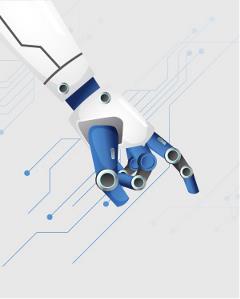 It is true that technology is eliminating the jobs that humans used to do – but it is not a purely destructive force.
It is true that technology is eliminating the jobs that humans used to do – but it is not a purely destructive force.
In Singapore, with the information and communications technology (ICT) industry being a critical growth area, the demand for ICT professionals is slated to increase by 42,300 over a two-year period from last year.
However, there is also a current lack of abundance – in the professionals with the suitable skillsets required for these ICT roles. As Former Minister for Manpower Mr Lim Swee Say said, “Should Singapore be hit by higher unemployment, it will be because of a shortage of skills – as a result of the widening jobs-skills mismatch – and not a lack of jobs.”
As automation and artificial intelligence (AI) take over the repetitive and mundane tasks that used to be completed by human hands, new jobs will be created and existing roles redefined.
The challenge, however, is how the workforce manages the transition.
According to the Future of Jobs Report by World Economic Forum, by 2020, more than a third of the desired core skill sets of most occupations will comprise skills that are not yet considered crucial to the jobs of today. Narrow technical skills, which were valued at the start of the digital revolution, such as programming and equipment operation, will start to become irrelevant as machines take over with greater speed and efficiency. On the other hand, skills associated with critical thinking, creativity and communication will become greater in demand across industries.
This change is already happening today, and existing working individuals that need to be retrained for the new job roles. In the new digital economy, they can no longer expect lifelong employment in a single niche role within a single company.
Beyond titles and designations
In view of the demand for emerging skillsets, employers are increasingly assessing potential hires not by a person’s last job description or title.
This is because the same designation could mean very different things across various companies. It also indicates an awareness that a candidate’s previous job might not have given him or her the required skills for the new position.
Hiring managers are adopting a more ‘forward looking’ approach in the screening process – instead of assessing a candidate purely on the qualifications and previous jobs, they want to know whether the person has the ability to adapt and apply learned skills.
The national SkillsFuture movement addresses this challenge – by encouraging the mindset and providing resources for Singaporeans to learn continuously at every stage of life. This requires the constant acquisition of new knowledge and skills, which would provide them with the flexibility to thrive in the shifting environments.
From 30th June to 4th August 2018, the inaugural SkillsFuture Festival will be held across the island, with more than 350 learning activities available for Singapore workers looking to pick up or enhance their skills and learn new things.
The five-week festival is the combined effort of more than 200 community, education and industry partners.
NUS-ISS’ involvement in the nationwide festival
NUS-ISS will be supporting the festival through a series of talks, seminars and roundtables. These include SkillsFuture Series Seminars ‘Building a data moat for your business’ and “Transformational cloud solutions for urban environment’, on the 2nd and 30th July respectively. These seminars are aimed at showcasing the SkillsFuture Series of programmes, which are courses that cover eight emerging and critical skills. They range from beginner to intermediate and advanced levels, catering to people at all stages of their learning journey.
The NUS-ISS Learning Day 2018, which will happen on 13th July as part of the SkillsFuture Festival this year, will feature keynotes by industry professionals, insightful panels discussions and hands-on demonstrations.
The line-up of exciting programmes include an workshop on how to build your own smart home with Raspberry Pi; a talk about how you can use reinforcement learning (RL) to teach a programme to play Blackjack; and an introduction to Blockchain, its key underlying concepts and a demo on Corda for financial trades.
The specially curated programmes are for working professionals who are keen to either gain a basic understanding or deepen their skills in the emerging areas, as well as to help individuals with specific skills sets meet changing job demands and stay competitive for the future.
More than just the technology
Given the rapidly changes brought about by technological disruptions, the way we work in the future will be vastly different from the situation today.
But instead of fear, the changes could be met with optimism – and while technology is the enabler, it is a human choice whether to take advantage of the opportunities that are arise.
For more information on the NUS-ISS SkillsFuture Series, click here
For more information on the NUS-ISS Learning Day 2018, click here